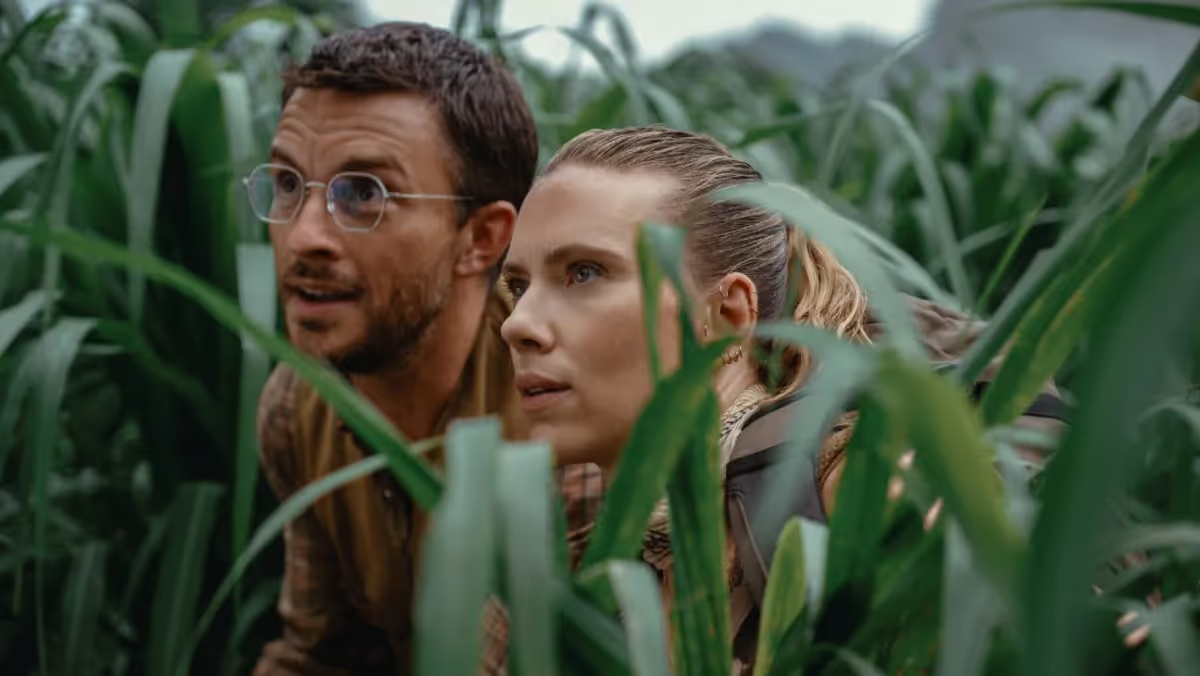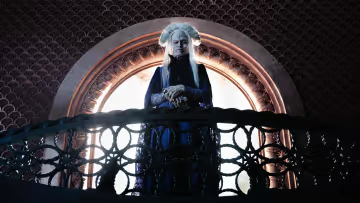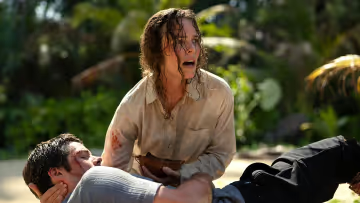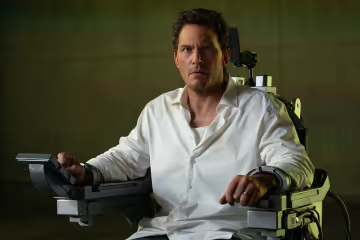In Review: ‘Jurassic World Rebirth,’ ‘Sorry, Baby’
A seventh 'Jurassic Park' movie makes its own boredom with itself a theme while a new writer/director/star leaves a fresh impression.

Jurassic World Rebirth
Dir. Gareth Edwards
133 min.
As Jurassic World Rebirth opens, dinosaurs are pretty much over and the world is pretty much over dinosaurs. After a scene-setting prologue, the seventh film in the series that kicked off with Steven Spielberg’s Jurassic Park in 1993 reveals that the dinosaur-filled world glimpsed in the final moments of 2022’s Jurassic World Dominion has largely fizzled out. Most dinosaurs, it turns out, don’t do so well outside an equatorial climate. (This new information might be scientifically dubious, but it conveniently walks back the events of the last few movies by confining surviving dinos to a few islands.) What’s more, dinosaurs are now considered borrrring. The death of the last brachiosaurus in Manhattan is treated as notable mostly because of the traffic jam it creates. Where once dinosaurs packed visitors into museums, now they’re about as popular as Electric State-themed Funko Pops.
Even before the events of the three previous Jurassic World movies—the ones with Chris Pratt and Bryce Dallas Howard that Rebirth doesn’t really care if you remember or not—the genetic engineers at InGen at least anticipated the waning interest. In the film’s prologue, we see they’ve crafted weird hybrids to keep the public’s interest from waning should they tire of the same old, same old.* Jurassic World Rebirth barely masks its identification with the scientists who’ve been forced to get creative to keep interest in an aging property alive. Every reference to the public’s fickleness feels like screenwriter David Koepp lamenting the difficulty of the task at hand as he returns to the series for the first time since The Lost World: Jurassic Park. But whatever meta touches Koepp might sprinkle on top, Rebirth is fundamentally a solidly built work made by committed professionals from top to bottom. The problem is, that description could also apply to a newly constructed Arby’s.
In an out-with-the-old, in-with-the-new gesture, Scarlett Johannson leads a cast of new faces (though Dr. Alan Grant gets a shout-out) as Zora Bennett, a mercenary hired by (the sort of sleazy-seeming) pharmaceutical exec Martin Krebs (Rupert Friend) to travel to a dinosaur-filled island where she’ll collect the fresh dinosaur blood needed for a miraculous new treatment for heart disease. But Zora won’t be alone. Filling out her team are fellow merc/boat captain Duncan Kincaid (Mahershala Ali), paleontologist Dr. Henry Loomis (Jonathan Bailey), and a handful of obvious redshirts. But wait, there’s more. Zora and her crew also pick up a family led by Reuben Delgado (Manuel García-Rulfo), a dad taking his two kids (one teen, one moppet-sized) and the teen’s boyfriend across the Atlantic, but run into some dino-sized trouble along the way.
There’s nothing here you haven’t seen before, though some of it you’ve seen in non-Jurassic movies. At times Rebirth, directed by Gareth Edwards (Godzilla, Rogue One), seems to be speedrunning through the Spielberg filmography, touching on the Jurassics but also Jaws and Raiders of the Lost Ark. The references remain superficial, as do the characters, with the reliable cast doing their best to flesh out roles defined by throwaway exchanges that explain both Zora and Duncan are working through some profound recent losses, then otherwise let them serve as flesh-and-blood action figures. It’s all quite watchable, with a wee dino seemingly thrown in to move a lot of stuffies, and it’s occasionally even engaging, thanks largely to Edwards’ ability to stage an action scene. Calling it a rebirth, however, is a bit much. It’s a recycling. —Keith Phipps
* Yes, Jurassic World (2015) already did this with the Indominus rex. No, Jurassic World Rebirth does little to acknowledge this.

Sorry, Baby
Dir. Eva Victor
103 min.
“The Year With the Bad Thing” is one of the five chapter titles in writer/director/star Eva Victor’s debut feature Sorry, Baby, which unfolds in a mildly scrambled chronology that effectively toggles between a traumatic event and the future that’s reordered by it. The “bad thing” is a sexual assault, perpetrated by a college thesis advisor, but the film flinches at words like “rape” or even “attack,” which is at times seems maddeningly conspicuous. (Vulture critic Alison Willmore goes into greater detail about it in her review.) A line like “that sounds like the thing” can make it feel like Sorry, Baby is dodging or softening the conversation, like the use of “smash-smortion” in Knocked Up to reference a tabled option for an unplanned pregnancy. Yet the film feels strongly aligned with its hero’s complicated feelings about what happened to her and how she has to live with it. The specifics of the assault and its long-term effects are treated with candor, even if the language (and, at times, the camera) stays at a marked distance.
Victor, a nonbinary artist who uses she/they pronouns*, stars as Agnes, an awkward yet striking and wryly hilarious young woman who teaches at a small liberal arts college in New England. As the film opens, Agnes’s good friend and former roommate Lydie (Naomi Ackie) comes to visit and the conversation only occasionally dips into a past that Victor waits another chapter to clarify. That’s an insightful narrative strategy from the start, in that Sorry, Baby is about living with a trauma that asserts itself fitfully, like the ache from an old injury during a cold snap. The film then flashes back to Agnes’ time as a student, when a meeting with her thesis advisor Decker (Louis Cancelmi), a young novelist who’d admired her work, turned into a life-changing violation.
Victor shoots the entire incident, wordlessly, from outside the house as day turns to night, choosing not to dramatize it, which fits into the general ethos of Sorry, Baby. Yet the details come out anyway in a tough scene with Lydie that night and an even tougher scene with a doctor the next day, who interrogates her with a brusque insensitivity that’s out of step with how she’s feeling. (A follow-up scene with two college administrators feels a bit redundant in its cluelessness, but it has the virtue of being funny.) Victor has an offbeat hitch to their dialogue and screen presence that takes some adjustment to embrace, but their sense of humor helps enormously, boosted by supporting performances by Ackie and Lucas Hedges, who has a sweet turn as Agnes’ neighbor-with-benefits.
The Hedges casting also firms up a connection between Sorry, Baby and Kenneth Lonergan’s Manchester by the Sea, another drama set in small-town New England about a character trying to live in the site of a past trauma. The comparison isn’t particularly flattering to Sorry, Baby—it’s hard to measure up to one of the great dramatists of his generation—but Victor does share their own insight about the triggers that can make such a situation hard to bear. That Agnes chooses to stay in town to teach, even occupying her advisor’s old office, speaks to a touching resilience that doesn’t suppress how she feels long term. The past can’t be changed. She can only process it as best she can. — Scott Tobias
* For consistency’s sake, I’ve opted to use “they” to describe Victor and “she” to describe Victor’s character.
Sorry, Baby is currently played in limited release.





Discussion